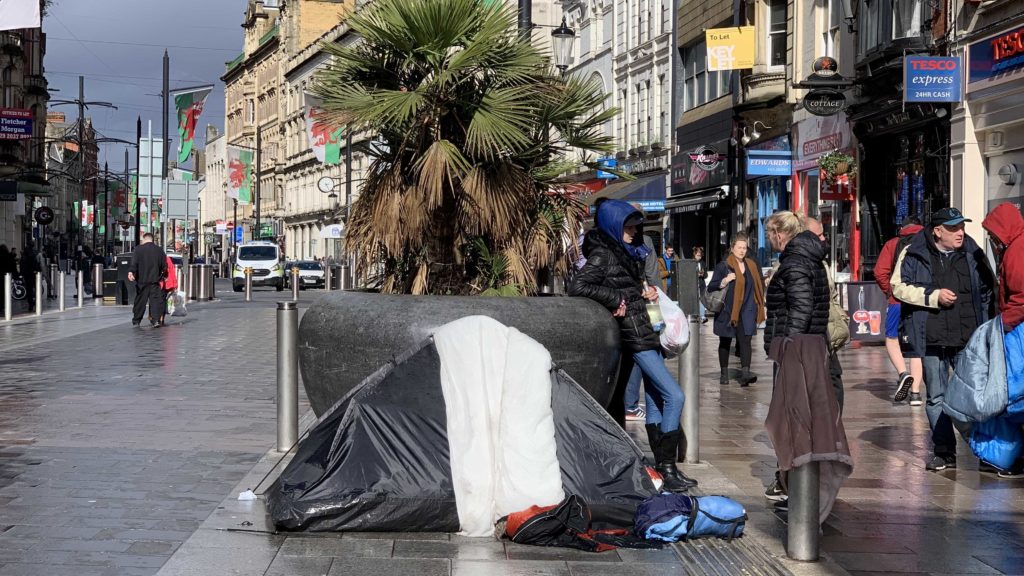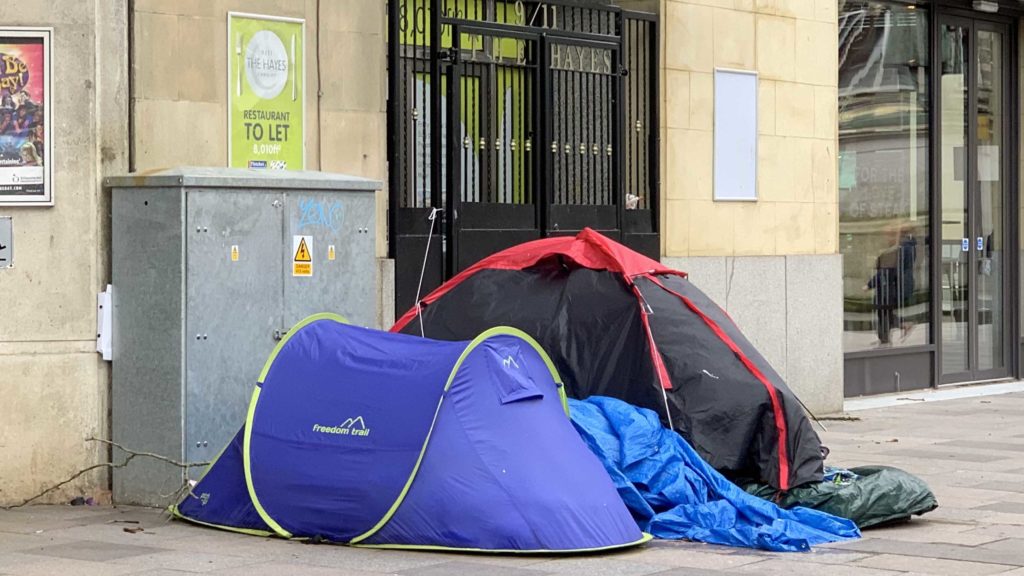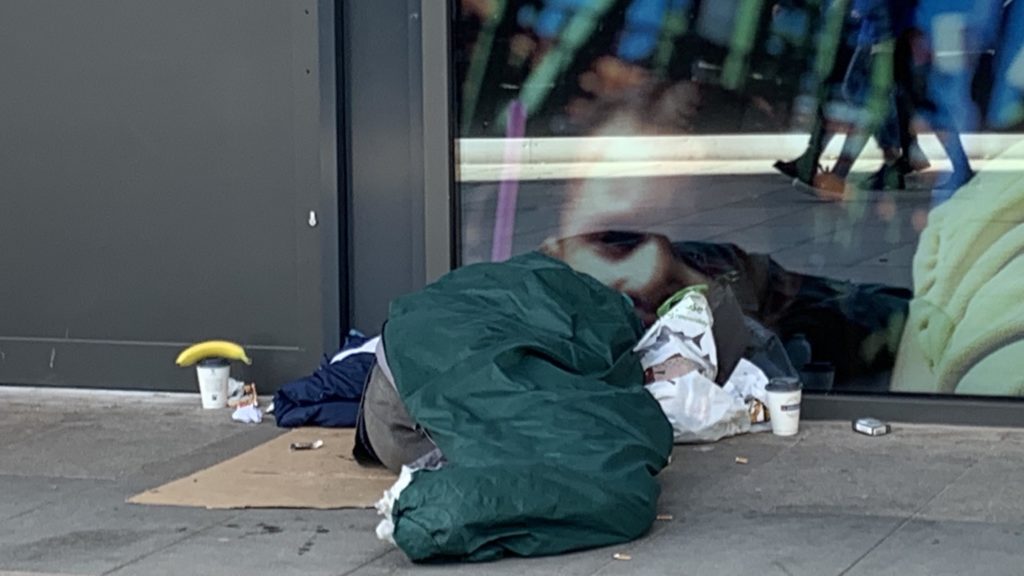Over 4500 were affected by homelessness in Cardiff last year. With more people living in tents in the city center, why is it so hard to get them into official accommodation?
The death of a homeless people often occurs on the streets of Cardiff. People never know what will happen in those tents on the side of the road, and then homeless people living in tents do not know when they are going to die.
According to the new ONS analysis, the number of homeless people in wales continues to rise, especially in Cardiff. Cardiff has been named one of the UK’s deadliest places for homeless people.
“Every death of a homeless people is a tragedy. In the tents on the streets of Cardiff, the number of drug users accounts for a large proportion,” said Karen Holkrook, operations manager of The Huggard Centre.
When people walk on the Queen street, they often see tents, some on the side of the road and some in front of the shops. These tents are closed for most of the time, and nobody knew anything about them.

Arguments among homeless people can often be heard in the streets, especially at around six o ‘clock in the morning or at one or two in the evening.
Faced with this trend, various homeless assistance organization in Cardiff began to strengthen its support for homeless people, such as increasing the number of beds, providing them with hot drinks and foods and strengthening security. On the other hand, Cardiff council also start notices urging tent dwellers to move on.
Huggard’s day centre helped 649 homeless people from Cardiff last year.
“We often offer everything that they need to sustain a normal life there. The day center is open all day, and we have a very good kitchen which offers good nutritious food at cost price. In addition, we have staff on duty to help them with any issues that they have as well as treat them a bit like a family really. And then, we look after their health, we try and get them to may keep doctor’s appointments,” said Karen.
Moreover, most homeless deaths are recorded by people living on the streets, who are used to living in tents. Although the tents do not all sprawl so much. However, if there are many tents presence on the city’s busiest shopping streets is seen by some as evidence of social failure or a dangerous element of a city, such as the Queen street in Cardiff.

Left Outside Alone is an assistance organization for homeless people run by a couple. They often provide food and warm clothes for homeless people who live on the streets.
“We can’t force them into anything, but we try and encourage them to engage the services,” said staff who working in Left Outside Alone.
On the other hand, the materials of the tent and the things inside the tent are all flammable items, such as food, clothes and bedding. Therefore, to a certain extent, tents are a safety hazard. According to the report of Welsh online, a tent was set alight on a patch of grass in Penarth Road last month. Fortunately, no one was hurt.
“It is not safe to live in a tent, because someone who smokes passes by the tent, it is easy to throw the cigarette on the ground or beside the tent, causing the tent to be set on fire. What’s more, most of the people living in the tents either use drugs or drink alcohol, and it is difficult for people to stay awake after taking drugs and drinking. We have seen homeless people sleeping in tents with cigarettes in their hands,”said Karen.
So, a few months after the number of tents shot up, the Cardiff council began issuing notices urging tent dwellers to leave, partly to keep the homeless safe and partly to keep the city looking good.

The reason why so many people don’t want to live in shelters is that tents are like home for them, making them feel safe and warm.
“During the coldest months of the year, it was the tent that saved my life. It made me feel safe, I don’t really come out of the tent, it was like my home. Without it, I would have nowhere else to go. It’s safer on the street than in a youth hostel,” said Shawna, a homeless people.
In addition, some homeless people think that shelters are full of drugs and thieves, and there is not enough space for them to rest and sleep.
“That place is hell and it needs security there. When I was beaten up and robbed and attacked and bullied and belittled in shelter, I try to complain to the staff about this, but they did absolutely nothing. And then, I end up smashing up the office and caused over ten thousand pounds with the damage as well as received eighteen months for prison. On the other hand, if you come too late, you don’t have any bed. When I went there, we had to sleep on the floor on the concrete floor. And people were going through everyone’s pockets, stealing their shoes, sitting their attire, their backpacks, anything that could sell for drugs and drink,” said Justin Howarth Davies, homeless people for twenty-five years.

Not having enough houses and living space is a cause that cannot be ignored.
The quickest way to solve the city’s tent problem is to provide a stable home for the homeless. However, the demand of housing is outstripping supply in Cardiff and even Wales, and there is a shortage of affordable housing. According to the latest housing demand released by the welsh government, an average of about 7,000 additional units will be needed annually over the next five years.
Most homeless people want to live in a relatively free space. They don’t want to share a limited space with many people. Besides, some of them also want to live in a safe and healthy environment.Even more homeless people say they would rather sleep in tents on the streets than in such crowded emergency shelters.
An emergency shelter is a temporary emergency measure rather than an optimal solution. Because appropriate and convenient accommodation is not only a reflection of respect and protection of the homeless, but also bring positive factors to their future life.
But the reason for homelessness is not so simple. Every homeless people has their own story, because might be they have experienced drinking, fighting, drug taking, prison and other things which makes it impossible for them to return to their families.
Lack of proper support for those released from prison is also contributing to the large numbers of homeless people.
“I was sentenced to 18 months in prison for the homeless assistance organization. They wanted me back, but they didn’t consider the psychological impact of this place, “said Justin.
According to the welsh government’s 2016-2017 statistics show that the leaving prison was the leading cause of personal threats to homeless people. This also means that people who have been in prison are at the bottom of society.
“I wouldn’t feel safe living there at all, and I would say with ninety-nine percent or even a hundred percent of the people would say they did not feel safe,” said Pobert Andrew Chamberian, homeless people live in the garage.
In addition, the exploitation of homeless people by drugs and the lack of protection for vulnerable groups of society are also reasons why homeless people are reluctant to live in shelters.
“These causes require psychological treatment and must be reduced to injuries rather than convictions. Our desire is to bring health, justice and housing together, ” said Lindsay Cordery-Bruce, chief executive of The Wallich.
In order to solve this problem, Cardiff Council also issued a new policy in May. Homeless people in Cardiff will have the opportunity to live in converted shipping containers by the end of the year. Additionally, these converted containers would have the same comforts as a traditional house.

